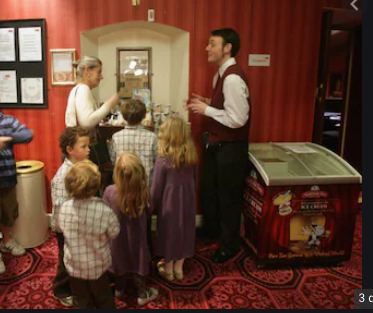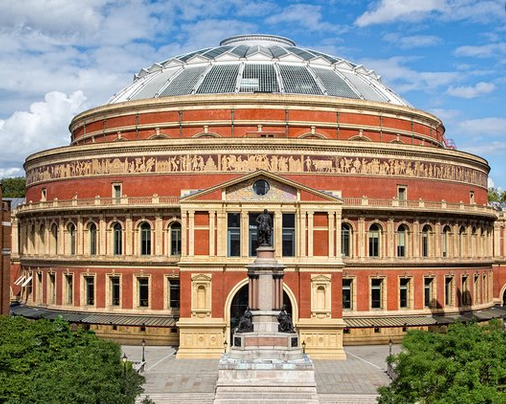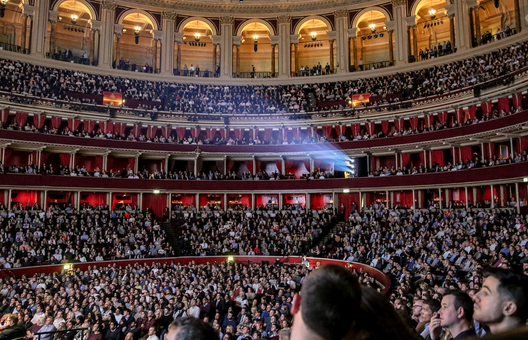Just the other day I wrote here about a columnist for the Daily Mail bemoaning the loss of the theatre interval, as it was the main part of the evening that he actually liked. That’s an extreme position; but so is the opposite one, as Lyn Gardner proposed in a column for The Stage yesterday, that was headlined: “Don’t give us a break – intervals are an outmoded, unnecessary theatre convention.”
She writes,
“Often an interval is only there to give audiences the opportunity to go to the lavatory and spend more money. It destroys the world of the play. Dispensing with the interval would remove another of those theatre conventions that are so much part of the experience that we’ve stopped questioning why they are there. The interval didn’t exist until theatre moved into playhouses and new candles were required to be lit to stop darkness descending.”
It’s also, she says, about giving autonomy to the audience — inviting them to come and go as they please, should they need to use the facilities, and by not “policing” them, making all performances “relaxed”, as at Battersea Arts Centre, “thereby immediately increasing accessibility and inclusivity.”
Maybe I’m just old-fashioned, but I don’t really want theatre to be a free-for-all, where my right to do as I please trumps my neighbour’s right to enjoy the show without me talking on my mobile phone, taking pictures with it, or munching on a Big Mac during the show.
Who decides exactly how relaxed performances are going to be allowed to be in this new world? If the audience are encouraged to treat the whole show like they are in an interval, why are even going to the theatre at all?

And the fact of the matter is that theatres NEED the revenue from interval sales of drinks, snacks (like the obligatory over-priced ice-cream, the purchase of which is pictured above) and merchandise to sustain their economic model. Who and what is going to replace that lost revenue? Maybe ticket prices would have to go up if they abandoned intervals. In which case, how is that promoting accessibility and inclusivity?
Of course, critics — like everyone — have the right to change their minds, but it is revealing that when Lyn Gardner was writing for The Guardian back in 2014, she actually wrote a column in praise of the interval:
“The quality of the interval can be as important as the quality of the show itself, but it’s not something that all venues recognise….
So what makes a good interval? No theatre can be held accountable for the quality of the company you keep, but they can do something about ensuring there are sufficient clean loos (with soap and hand-drying facilities), enough trained bar staff to deal with the rush, fair prices for quality wine and coffee, and that the ice-cream hasn’t been taken out of the freezer so early that it’s melted into a sad puddle….
But I’ve reason to feel affection for intervals: the first words I ever exchanged with my partner took place during a chance encounter at an interval at the Donmar.”
Clearly her thinking on intervals has evolved in the last seven years. And maybe after the pandemic-prescribed year-long interval we’ve just had, it has changed all our thinking around events that can cause crushes and unnecessary social interactions.
The pain and perils of having to rebook tickets again and again
Just yesterday I wrote here about the constant rebooking regular theatregoers have had to do during lockdown for performances that have been postponed.
Of course I know I’m not alone. And by coincidence, columnist Zoe Williams also wrote about the problem yesterday in The Guardian regarding her constant round of re-bookings for Six and Back to the Future.
“At this point, I had virtual gift cards swimming across my inbox and no human way of keeping track of them. Then I got a call from Michael at the box office. “I thought the phone might be easier,” he started. “Also, I’m a bit bored.” “Me too. Terribly bored. What I need is some musical theatre.” Well, that is where he could help, so long as we understood that all this was hypothetical and impossibly distant. I may as well have been booking a seat on the first commercial trip into space or organising the cryogenic storage of my body.
I ended up planning Back to the Future for May and Six – for the sixth time – for September. I guess I will be speaking to Michael again in April, and then in August, and possibly in between, which is roughly as often as I speak to the members of my extended family.”
The Royal Albert Hall at 150….
The nation’s village hall, as the Royal Albert Hall has been famously dubbed, is one of the most democratic and yet awe-inspiring performance spaces in London: as at the Globe, the standees in the main arena for the Proms actually get the best views, and are most actively part of the music making. And despite the exclusivity of the tenured boxes, there are seats for all wallets here.


Yesterday marked its 150th birthday. I’ve had some amazing nights here, not least when the Olivier Awards relocated here and I attended them twice. (I missed their first year here, as I was away in New York). But though it is occasionally used as a theatre venue — for concert performances of musicals like Chess that I’ve seen here, or the Phantom of the Opera’s 30th anniversary showing — I’ve mainly come here for concerts from Liza Minnelli to Diana Ross, as well as a Prom or two (including a wonderful Prom of Leonard Bernstein’s Wonderful Town in 1999 that featured Audra McDonald as Eileen and Kim Criswell as Ruth).
VIDEO: McDonald and Criswell perform the Wrong Note Rag from Wonderful Town at the Royal Albert Hall.
Visiting the Albert Hall always comes with a sense of expectation — and the thrill when you enter the warm embrace of its auditorium never goes away.
